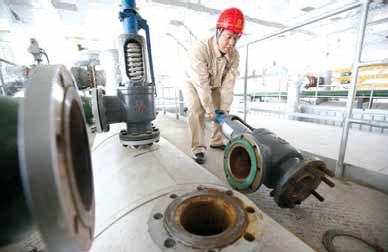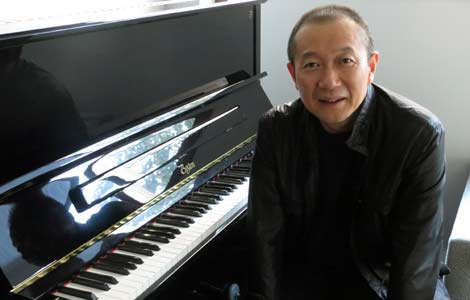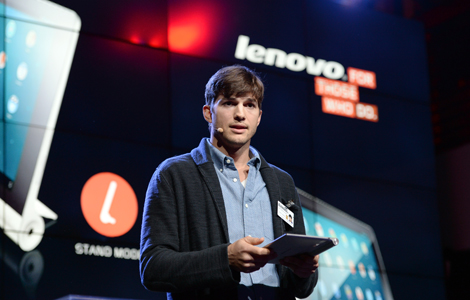Capital vows cleaner energy mix for winter
Updated: 2013-10-31 07:08
By Zheng Xin (China Daily)
|
||||||||
A Beijing environmental protection official vowed on Wednesday that the city will have an effective energy mix for the coming winter heating season.
During a visit to a former coal-fired boiler in Chaoyang district, Liu Wei, a deputy director of Beijing Environmental Protection Bureau, said the city will replace its use of coal with natural gas for downtown areas in an effort to reduce smog levels in the capital.
 |
|
A worker examines and fixes a gas-powered boiler in a community in Beijing. The capital is making efforts to replace coal-fired boilers for heating to reduce pollution during winter. Fu Ding / for China Daily |
"The city is confident that it will reduce the concentration of dust, smoke and the amount of sulfur dioxide in the city as the project proceeds," Liu said.
The burning of coal accounts for 16.7 percent of PM2.5, particulate matter with a diameter smaller than 2.5 micrometers that can easily be inhaled into the lungs, in the capital's atmosphere.
The boiler in Chaoyang district is one of 115 coal-fired boilers in the city that is being refitted this year to use natural gas. The boiler will burn 2,407 metric tons of gas per hour and provide heat for more than 200,000 households while covering more than 20 million square meters, according to the bureau.
With an investment of 1.3 billion yuan (more than $213 million), the project aims to reduce coal consumption by 600,000 tons a year, sulfur dioxide by 1,680 tons and smoke and dust by 1,392 tons.
According to the capital's plan to limit coal consumption, all coal-fired boilers in the downtown area will be replaced with natural gas burners by the end of 2014.
Since 2001, when the capital initiated its coal reduction project, there has been a sharp drop in the amount of sulfur dioxide in the city's atmosphere, according to the bureau. In 1998, there was 120 micrograms of sulfur dioxide per cubic meter; this year, it was cut to 28 micrograms per cubic meter.
The capital aims to replace large-scale coal-fired boilers in its suburban areas by the end of 2017.
Liu admitted on Wednesday that there is a long way to go before capital residents see smog-free winters.
"To replace coal with natural gas for heating and power will cut down on the intensity of sulfur dioxide, smoke and dust in the air, but it won't necessarily mean we'll have a smog-free winter. The capital has various sources of pollution and coal is only a part of it," Liu said.
Responding to questions about Beijing's lack of natural gas, Liu said the capital has a sufficient supply of natural gas for the coming winter.
The city buys its natural gas from the Inner Mongolia autonomous region, the Xinjiang Uygur autonomous region, and Shaanxi and Hebei provinces.

 Tan Dun premieres new work with Philadelphia Orchestra
Tan Dun premieres new work with Philadelphia Orchestra
 Two firms to debut in US at higher prices
Two firms to debut in US at higher prices
 Women fight to become China's next oceanauts
Women fight to become China's next oceanauts History under a new light
History under a new light
 Kung fu master becomes hit online
Kung fu master becomes hit online
 Color-blind love
Color-blind love
 Lenovo's new secret weapon: Hollywood star
Lenovo's new secret weapon: Hollywood star
 Brussels visit heralds closer trade ties for EU and China
Brussels visit heralds closer trade ties for EU and China
Most Viewed
Editor's Picks

|

|

|

|

|

|
Today's Top News
China ‘urges’ US to explain phone taps
US students compete in Chinese
The Chinese dream in ink
'Dangerous provocation' by Japan condemned
Freer RMB 'can answer US claims'
Two firms to debut in US at higher prices
Ministry opposes disclosure of WTO report
Obama calls for foreign investment
US Weekly

|

|






